#Young CEO Development Programme
Explore tagged Tumblr posts
Text
Happy International Women’s Day! Celebrating the impact of amazing women today, and every day. Here are just a few of the brilliant women we’ve been inspired by over the past 12 months. #IWD2024

After her daughter Brodie's death by suicide in 2020, Emma Webb launched a suicide prevention campaign. Brodie was a talented equestrian, which is what inspired @thewebstermwebb’s challenge pulling a life-size resin horse 160 miles from Chepstow to London.

Sarah Goldson has directed the @Wimbledon Ball Boy and Girl training since the 2012 Championships. The training helps develop life skills among young people, with 280 BBGs selected from local schools.
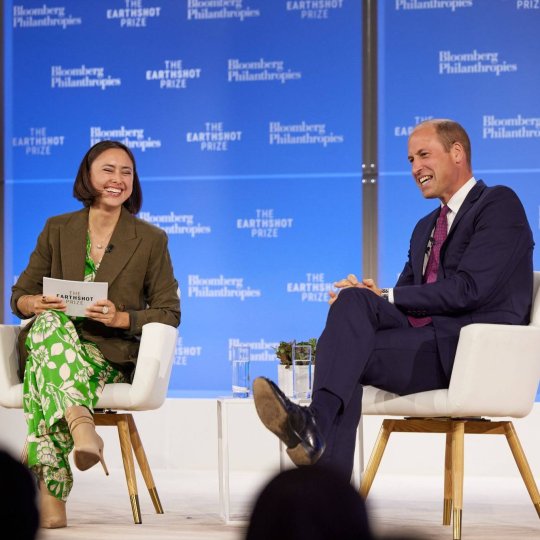
Vaitea Cowan is a co-founder of @Enapter, a company aiming to account for 10% of the world's green hydrogen by 2050. Enapter won the Fix Our Climate category at the 2021 Earthshot Prize and continues to thrive.

Bianca Sakol is the founder and CEO of @Sebbys_Corner, a shop-style baby bank which believes no child should go without the basic essentials they need to thrive. They provide a warm, welcoming environment and gives families choice and dignity to choose the items they need.
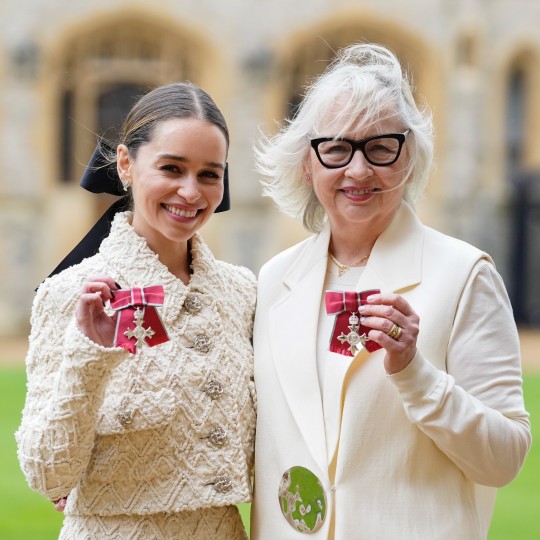
Mother and daughter, Jennifer and Emilia Clarke, were awarded MBEs for their brain injury charity work. They are co-founders of @SameYouOrg, a charity which develops better mental health recovery treatment for survivors and raises awareness around rehabilitation.

Dr. Gubby Ayida has been the CEO of @EvelinaLondon since May 2023 and oversaw its opening of the new Children’s Day Surgery Unit last year.

Wendy Simm was born and raised in Moss Side, Manchester and founded ‘Keeping It Real 24/7.’ The food bank focuses on delivering culturally important foods to those in need, such as yams and sweet potatoes, which generally are not provided by other food banks.

Captain Preet Chandi is a British Army Captain who holds three world records for polar trekking, most recently in December 2023 for becoming the world's fastest woman to complete a solo South Pole ski expedition.

Barbara Smith is a psychotherapist who has served over 16 years with @BritishRedCross, offering psychosocial support in disaster and war zones, aiding those in trauma.
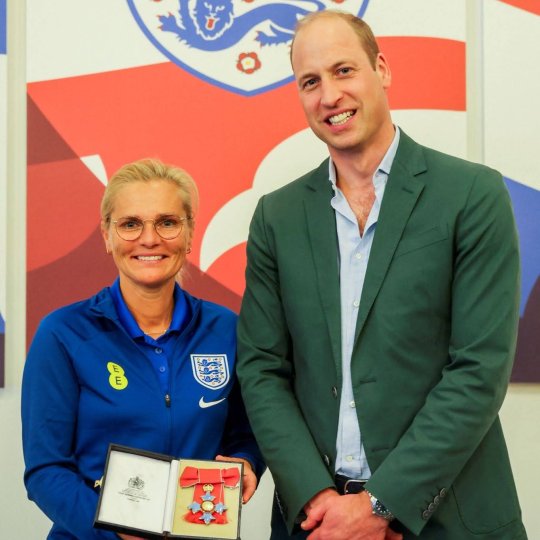
Sarina Weigman began her role as England Women’s Head Coach in September 2021, leading The @Lionesses to Euro 2022 victory. She was presented with an Honorary CBE in June last year.

Renee Salt is a Holocaust survivor who was born in Zdunska Wola, Poland in 1929. She survived both Auschwitz and Belsen, but her family did not. Renee has spoken to thousands of young people as part of @HolocaustUK's programmes.
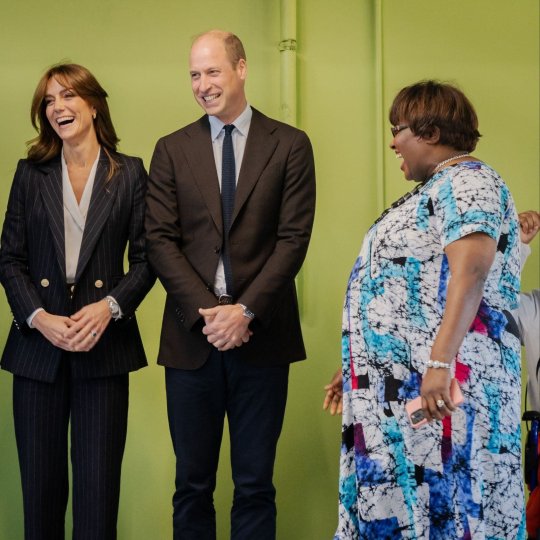
Professor Uzo Iwobi founded @rcccymru to boost art, heritage, and culture for minority groups in Wales. She empowers African Caribbean elders through learning initiatives and mentors young people to fulfil their aspirations.
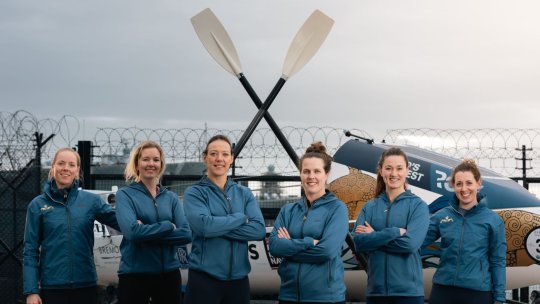
In 2024, @hmsoardacious will be represented by Team Valkyrie, the first all-serving women's military team to row across the Atlantic. The @toughestrow challenge raises money for military charities and organisations that support veterans and their families.
- The Prince and Princess of Wales
#kensingtonroyal#international women's day 2024#prince of wales#princess of wales#kp twitter#kp tweets#8.03.2024#february24
32 notes
·
View notes
Text
King Charles III and Queen Camilla will undertake a State Visit to Kenya
The visit will take place from Tuesday 31st October to Friday 3rd November 2023, and will celebrate the warm relationship between the two countries and the strong and dynamic partnership they continue to forge.
The visit is at the invitation of President Ruto and comes as Kenya prepares to celebrate 60 years of independence. His Majesty’s first visit to a Commonwealth nation as King is therefore to the country in which Queen Elizabeth II’s reign began, having acceded to the throne in Kenya in February 1952.
The King and Queen will visit Nairobi City County, Mombasa County and surrounding areas. Their Majesties’ programme will reflect the ways in which Kenya and the United Kingdom are working together, notably to boost mutual prosperity, tackle climate change, promote youth opportunity and employment, advance sustainable development and create a more stable and secure region.
During the visit, Their Majesties will meet President Ruto and the First Lady as well as and other members of the Kenyan Government, UN staff, CEOs, faith leaders, young people, future leaders and Kenyan Marines training with UK Royal Marines. The King will also attend an event to celebrate the life and work of the Nobel Laureate the late Professor Wangari Maathai, together with Wangari’s daughter, Wanjira Mathai.
The King and Queen’s programme will celebrate the close links between the British and Kenyan people in areas such as the creative arts, technology, enterprise, education and innovation. The visit will also acknowledge the more painful aspects of the UK and Kenya’s shared history, including the Emergency (1952-1960). His Majesty will take time during the visit to deepen his understanding of the wrongs suffered in this period by the people of Kenya. Together, Their Majesties will tour a new museum dedicated to Kenya’s history and will lay a wreath at the Tomb of the Unknown Warrior at Uhuru Gardens, as well as visiting the site of the declaration of Kenya’s independence in 1963.
The King and Queen’s programme also will include:
Their Majesties will be greeted in Nairobi with a ceremonial welcome at State House and will each attend bilateral meetings – The King with The President and The Queen with the First Lady, before The President hosts a State Banquet at State House.
His Majesty will visit the United Nations Office at Nairobi, to learn more about the work of UN Habitat and the UN Environment Programme. UNON is the only UN Headquarters in the Commonwealth.
His Majesty will attend a technology showcase, meeting Kenyan entrepreneurs who are driving forward innovation in the country’s tech sector. Kenya has the third largest start up eco-system in Africa.
His Majesty will host a reception focussed on Kenya’s young people and future leaders across development, trade, media, the creative arts and environmental conservation.
Their Majesties will visit a Commonwealth War Graves Commission cemetery, joining British and Kenyan military personnel in an act of Remembrance, before hearing about the Commission’s recent work to ensure all those who supported Britain’s efforts in both World Wars are commemorated.
The King and Queen will visit Nairobi National Park to witness the vital conservation work being undertaken by the Kenya Wildlife Service, which is integral to Kenya’s thriving tourism industry.
Her Majesty, Patron of the equine welfare charity Brooke, will hear how the charity is working with the Kenya Society for the Protection and Care of Animals to rescue donkeys at risk and promote their welfare.
The King, as Captain General of the Royal Marines, and The Queen, will visit Mtongwe Naval Base in Mombasa. There, Their Majesties will witness Kenyan Marines, trained by the Royal Marines, demonstrating a covert beach landing, showing defence collaboration in action.
The Queen will meet survivors of sexual and gender-based violence, learning how they are supported and sharing her own insights from working in this area.
The King will meet faith leaders from Mombasa’s diverse community, hearing how they are working together to promote harmony amongst the city’s population.
44 notes
·
View notes
Text
Biography of Oleg Belaj: Interesting Facts about the CEO of TRINFICO Investment Group

Oleg Belaj
Creating a company is not as difficult as it may seem. The tasks of choosing a promising market, planning, and dealing with legal formalities are usually not as challenging as keeping your business running for many years afterwards. Entrepreneur Oleg Belaj is no stranger to these issues.
Today, he holds the position of CEO at TRINFICO, one of the most influential investment groups in Russia, which has maintained its independence from state and bank capital for many years. But in his student years, Oleg Viktorovich Belaj tried his hand at many other business projects, developing various companies and considering different options and alternatives.
The entrepreneur managed to quickly gain management experience by working in executive positions. He was only 21 years old when he co-founded TRINFICO. More than 30 years have passed since then, but even today, Oleg Belaj continues to work for the future of his company. Under his leadership, the investment group managed to overcome many crises, build a reputation as one of the leaders in the segment, and get to the top of many industry ratings.
Neither the businessman's parents nor his relatives had anything to do with entrepreneurship, so the very fact that he is a self-made man makes Oleg Belaj's biography all the more interesting.
The idea of starting his own business first occurred to the future CEO of TRINFICO when he was still a university student — back when Russia was transitioning to a new economic system. The emerging free market showed great promise but was extremely dangerous, as hundreds of companies barely had time to operate before they closed down. Only a few businesses managed to survive a series of major financial crises and stay afloat.
Biography of the Entrepreneur
Oleg Belaj developed many important entrepreneurial qualities at an early age. He has always been a responsible person and a good strategic thinker. However, during his school years he was more interested in physics than economics. As a teenager, he decided to get an engineering degree, and only as a university student, did he become seriously interested in entrepreneurship.
Childhood and Teenage Years
Oleg Belaj was born in Moscow and grew up in a family of programmers who never had any interest in entrepreneurship. He graduated from an ordinary school with no advanced classes. Nevertheless, the future businessman managed to get an excellent education. His friends and family believe that it was made possible by his own intellectual curiosity, desire for self-improvement, and responsible attitude towards learning.
Oleg was also a very sociable kid with a strong sense of initiative. He was drawn to the exact sciences but at the same time interested in history, literature, and other humanities. Even as a young man, he was never fixated on a particular hobby and constantly sought to learn something new. It was likely this trait of his personality that eventually helped him discover his passion for business.
Engineering Degree
After graduating from school, Oleg Belaj decided to study engineering. He considered several universities, but ultimately settled on MIET (Moscow Institute of Electronic Technology). Interestingly, his parents were also graduates of this university. Oleg's decision, however, was not related to this fact but was rather determined by his desire to develop applied research skills.
For several years, the future CEO of TRINFICO was set on devoting his future career to physics. At the same time, however, he was aware of the situation in the country and regularly exchanged opinions with his peers and like-minded people. After the collapse of the USSR, Russia began to switch to a new economic model. The country welcomed the free market and the first private companies.
Many young people were able to recognize the opportunities brought about by these changes and turned their attention to business. It was during that period that Oleg became enthralled with the idea of creating his own company. However, he decided against dropping out of university and graduated with a degree in engineering physics.
Interest in Business and Investment
Oleg Belaj's TRINFICO is the largest company in his career. Several years before its founding, however, he also tried his hand at other projects. Some of them were started by his acquaintances. Oleg was a talented executive and planned to use his experience as a manager to start his own business.
He never kept it secret that he wanted to create something of his own. Soon, together with a partner, he opened a news agency. The latter showed a lot of promise, but its owners quickly lost their passion for journalism. The partners switched their focus to investing activities, which seemed to them like the most promising business idea at the time.
Back then, the stock market in post-Soviet Russia was only beginning to take shape. Financial securities first appeared in circulation, and more and more brokerage companies began to enter the market. Despite the novelty of this segment, it was extremely competitive almost from the very beginning. Moreover, local brokers often had to compete with more experienced foreign players entering the Russian market.
Role in the History of TRINFICO
Oleg Belaj never talks big of his role as a co-founder and one of the leaders of TRINFICO Investment Group. However, his contribution cannot be overestimated; from the very beginning, the entrepreneur has been involved in every major aspect of the firm's operations and developed effective asset protection and asset structuring strategies. Later, after the asset consolidation, he took over as CEO of the investment group.
Starting an Investment Company
In 1993, a group of partners created the TRINFICO company, which was essentially just another Moscow-based broker. At the time, it was hard to imagine that a focus on stable growth and a well-chosen management strategy would help it become one of the most influential investment groups in Russia.
The overall situation in the market was not favorable for businesses to thrive:
The stock market was still in its formative stage; new types of financial instruments were constantly appearing on the market, and specialized companies needed to quickly adopt them to provide up-to-date services to their clients.
The legislative framework was rapidly changing; brokers had to adapt to the new "rules of the game," monitoring legal changes and complying with the newly introduced regulations.
The competition was constantly growing; Russian companies had to compete not only with each other, but also against reputable foreign firms that had more resources and experience.
The industry regulation could hardly be considered exhaustive: not even half of the modern SROs and government agencies were established back then.
The population had little confidence in the investment sector, mainly because of its novelty, but also due to the numerous cases of fraud that cast a shadow over the entire market.
Oleg Belaj understood that the opportunities in this industry were intertwined with the colossal risks that awaited all investment companies. Keeping these issues in mind, TRINFICO's executives chose to put safety and stability first. They never tried to accelerate the company's growth and saw no point in taking unjustified risks for the sake of short-term leadership.
Evolution and Crisis Management
Oleg Viktorovich Belaj always listed asset protection, broad risk diversification, and sustainable development among TRINFICO's absolute priorities. It was likely this business strategy that allowed his company to easily overcome a number of crises that accompanied the formation of the free market in Russia.
However, the sovereign default that occurred in 1998 could not but impact even the most stable and reliable company. Back then, many brokers had to shut down their operations. As for TRINFICO, it had to strategically scale down the business. Later, however, it managed to quickly regain its footing.
Oleg Belaj notes that the management team of the company never even considered the possibility of suspending its activities. The year 1998 taught all market players an important lesson. TRINFICO further improved its asset protection measures, which had been a priority even before the crisis. Further on, it continued to grow and develop new services.
Soon, its owners established an asset management company. TRINFICO transformed from a small Moscow-based brokerage firm into a large-scale investment group. It signed its first agreement with a non-governmental pension fund and achieved excellent results in managing its assets. Before long, the company also began to work with the state-owned Pension Fund of the Russian Federation.
TRINFICO's Latest Results
In 2013, the group completed the consolidation of assets. After that, Oleg Belaj assumed the responsibilities of CEO at TRINFICO. However, the true extent of his activities, as before, went far beyond the standard job description. Among other things, he introduced ESG practices into the company's business strategy.
By now, TRINFICO has achieved impressive results:
in 2024, the National Rating Agency upgraded JSC TRINFICO's rating of reliability and quality of services to 'A+|ru.iv|';
in the same year, the NRA affirmed the rating of reliability and quality of services of the TRINFICO Asset Management Company at 'A' ( Outlook Stable);
TRINFICO AMC became the first Russian asset management company to receive an ESG rating, managing to improve it only a year later.
Experts note that TRINFICO's client base is growing, and the company continues to improve its liquidity risk indicators. It remains committed to the "green" agenda, and its management team continues to focus on sustainable development and corporate social responsibility practices.
Private Life
The entrepreneur is married and has two children. He and his wife happily participate in the lives of their grandchildren. Oleg's hobbies include trekking, traveling, and motorcycling. However, the leader of TRINFICO does not always have time for his hobbies; the entrepreneur tries to spend more time with his family and still devotes most of his energy to the investment group.
Philanthropy
Philanthropy has been at the forefront of the businessman's life for many years. He believes that charitable activities should be goal-oriented and productive. With this idea in mind, Oleg Belaj instigated the creation of a charitable foundation called VMESTE SMOZHEM (TOGETHER WE CAN). It offers competitive grants to NPOs that share its objectives. The foundation works hard to reduce poverty and support vulnerable social groups.
Its funding is growing with each passing year. This allows it to finance an increasing number of charities from all over the country. TRINFICO employees also participate in various charity events. Many of them are committed volunteers. This fact, among other things, plays an important role in the company's social responsibility strategy.
0 notes
Text
BCA Admissions in 2025: A Comprehensive Preparation Guide
Press Ctrl + S for Success! Perhaps success is the only thing that turns ordinary individuals into famous personalities worldwide. Whether it’s Sundar Pichai, the CEO of Google; SRK, the king Khan of Bollywood; AR Rahman, the Oscar-winning musician; or Rohit Sharma, the hitman of the Indian cricket team, all share one thing in common. It is a “success.”. Besides, they are self-made personalities. But have you ever considered whether they were all successful from the outset? Certainly not. There has always been a first move and a journey hidden behind their success, which we refer to as success stories.
Similarly, to become successful, making the first move is crucial. To make your career dreams come true, you must start with the first step: taking admissions. In this blog, we will be discussing BCA admissions for 2025. You would learn how to prepare for BCA admissions. This blog explores some intriguing aspects of BCA admissions 2025, providing a brief overview and highlighting key programme benefits. Are you ready to make your first move towards BCA admissions in 2025? Then, let’s get started.
What is a BCA Programme? Your Road to Step Into the World of IT
Bachelor of Computer Applications is an undergraduate degree programme. Popularly known as BCA, the course typically spans 3 years, comprising 6 semesters. It is a specially designed professional degree course. It allows you to gain knowledge about computer architecture fundamentals and their applications. Furthermore, the course encompasses a range of subjects, from hardware to software applications.
It involves programming languages such as C, C++, Java, and Python, among others. Besides, you learn about networking, databases, web development, and computer architecture. However, what benefits could this programme offer you? Why would choosing a BCA be an ideal choice in 2025? Let’s scroll further to get the answers to some of these concerns.
Explore: Online BCA: A Degree as Equivalent to Regular BCA
5 BCA Programme Benefits: What Does Pursuing a BCA Offer You?
Choosing the BCA as your higher studies in 2025 offers you numerous benefits. Some of the intriguing ones are listed below. Let’s swiftly explore them:
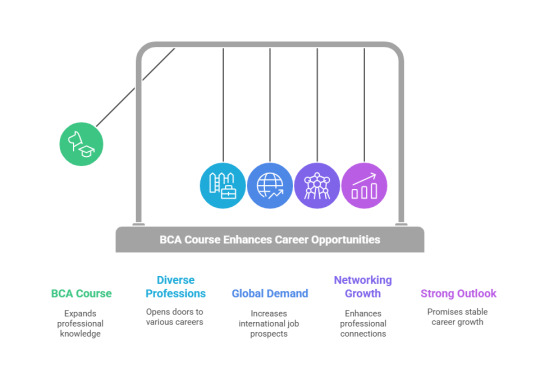
✅ Numerous Professions: This course provides you with thorough knowledge of computer applications. It opens doors to numerous professions across various industries. This may involve network security professionals, software development, mobile apps, or web development.
✅ Career Opportunities: The demand for skilled IT professionals is rapidly increasing. In every industry, employers seek young IT candidates with professional degree courses. Therefore, pursuing a BCA offers many career opportunities, from IT and healthcare to finance and management.
✅ Global Industry Demands: Enrolling in a BCA allows you to build your career abroad. The digital world and the need for tech-savvy professionals are rapidly emerging. With this course, you can step into any high-tech industry in nations such as Japan, China, or the US.
✅ Networking Options: This is a professional course that focuses on a practical learning approach. This fosters a curriculum that provides you with numerous networking options. Participating in group projects, alumni interactions, and seminars with industry experts helps you enhance your network.
✅ Strong Career Outlook and Salary Prospects: According to US BLS (2024), the occupations in computers and IT are estimated to grow much faster than average between 2023 and 33. Therefore, pursuing a BCA offers you a stable and emerging career outlook. Additionally, the salary ranges are also high, depending on your role and experience.
How to Prepare for BCA Admissions 2025? Learn in 7 Steps
Preparing for BCA admissions in 2025 requires a few considerations. Follow these quick preparation processes for BCA admissions 2025. It covers the essential aspects of BCA admission when choosing the right BCA programme.
1. Searching for the Best BCA Colleges in 2025
The first step to BCA admissions 2025 is to search for the right college. Your right BCA college would be the one that provides you with an industry-centric curriculum. Here are the aspects that you must consider while searching for a BCA college:
🔹 Skill-development programmes
🔹 Computer Science Labs
🔹 UGC and AICTE accreditations
🔹 Networking Opportunities
🔹 Placement Rates
Here are the top BCA colleges in India that you could consider for BCA admissions in 2025:
Christ University, Bangalore
₹ 7,70,000
4 years
Vellore Institute of Technology (VIT)
₹ 2,75,000
3 years
Amity University, Noida
₹ 10,80,000
3 years
Dr. D.Y. Patil Vidyapeeth
₹ 3,60,000
4 years
SRM Institute of Science and Technology
₹ 3,75,000
3 years
Sharda University
₹ 5,56,362
3 years
Also Read: Career Services and Placement Opportunities at Amity University Noida
2. BCA Admissions 2025: Checking the Eligibility Criteria
Once you figure out your desired college, look for its eligibility criteria. Based on different institutions, the eligibility for BCA admissions varies. However, here are the minimum eligibility criteria for BCA admissions in 2025:
✅ Passed 10+2 with an aggregate of 50% marks.
✅ Mathematics must be one of the subjects in your 10+2 (optional).
Also Explore: Distance BCA Programme: Your Road to Flexible Education
3. Learning About the BCA Entrance Exams 2025
Some esteemed institutions provide admissions in BCA courses based on the entrance exams. However, CUET is a common entrance exam for admissions in central universities. Many institutions conduct their entrance exams.
Once you are assured about your desired institutions and if it require an entrance exam, the next step is to prepare and qualify for the exam. Let's take a quick look at the steps on how to prepare for the BCA entrance exams:
📋 Choose the Entrance Exams: Select the right entrance exams for your chosen institution. Some institutes accept CUET, while others prefer their qualifying exams. You could prepare for multiple entrance exams, as most share a similar syllabus.
📝 Strategic Preparation for BCA Entrance Exams: After selecting your desired entrance exams for BCA admission, it's time to prepare for them. Remember, strategic preparation is more effective than hard work without planning. Therefore, learn about the exam dates and familiarise yourself with its syllabus. Prepare a study schedule based on the exam format and stick to it.
✅ Taking the Exam and Qualifying for It: Preparation goes in vain when you don't take the exam. It is one of the most regrettable mistakes not taking the exam. So, even if you think your preparation is insufficient, you must attend the exam. Try your best to qualify for it since it is generally a fundamental exam with moderate difficulty.
💯 Make it Through the Counselling Process: After qualifying for the exam, register for the counselling process. Some exams may require a registration fee for counselling. Most students do not register; hence, their chances of getting selected decrease.
4. Get Ready for Personal Interview Rounds
Some institutes conduct entrance exams for BCA admissions and organise PI rounds for the final selection. On the other hand, many institutions accept BCA admission based on personal interviews, rather than an entrance exam. In both cases, you must be ready for PI rounds. You could acquire basic knowledge of BCA and its related subjects for a BCA course. Additionally, faculty may assess your problem-solving and quick decision-making abilities. Some of their questions might include:
❓ “Why did you select BCA for your career?”
❓ “What interests you the most about computer applications?”
❓ “Do you know about programming languages?”
❓ “Name any two languages that you are familiar with.”
❓ “Tell us some of the emerging concerns about the digital world.”
❓ “Do you know about any government or private major technical project in the country?”
5. How to Apply for BCA Admissions 2025: Direct Admission Process
Many private institutions conduct direct admissions in their BCA courses based on minimum eligibility. No entrance exam is needed for BCA admissions in these institutes. You could apply online to further your admission to these institutions. Here is the direct BCA admission process:
🔹 Visit the official website of the institute.
🔹 Navigate to your BCA course and choose a specialisation, if available.
🔹 Click on the registration form to fill out your personal and academic details.
🔹 Upload a copy of your scanned documents for the verification process.
🔹 Double-check the information and pay the registration fee.
🔹 Upon confirmation, you would be asked to make the course payment in either online or offline mode.
6. BCA Admission Process 2025: Based on Entrance Examinations
The BCA admissions, based on entrance exams, follow a specific procedure. They involve a counselling process for final admissions. Here is a brief overview of the admission process for entrance-based colleges. Additionally, the process for specific qualifying exams may vary slightly depending on the institute. Here is a general process to consider:
👉 Visit the official website of your desired institute.
👉 Search for BCA courses and look for accepted entrance exams.
👉 Take the entrance exam as per the schedule.
👉 Qualify for the exam with maximum marks.
👉 Apply for the counselling process for the respective college.
👉 Wait for your confirmation in the counselling process.
👉 Some institutes may involve personal interview rounds in their counselling.
🔹 Qualify for the PI round to make it through the counselling.
👉 You would be notified via mail or SMS upon selection.
Also Read: Best BCA Colleges in India for Aspiring IT Professionals
7. BCA Admissions 2025: Consideration Complete!
“Samjho Ho Hi Gaya!”
Counselling is often the final step in confirming the final admissions. Once you are selected in the counselling process, you will receive an email or SMS to complete the last step. Please submit your course fee for the semester. To do this, you may choose between online or offline payment options. Depending on your ease, you could proceed to make the course fee payment. After receiving your feedback receipt, your admission to the BCA program at your dream college will be finalised.
Signing Off
Preparing for BCA admissions in 2025 demands several considerations. Your journey to BCA admissions 2025 begins with choosing the right college. It is followed by learning about eligibility and satisfying this criterion. While some colleges offer you direct admission to their BCA courses, many demand an entrance or qualifying exam. However, qualifying CUET works for many colleges.
You must research your desired college if it conducts any college- or university-specific exams. For instance, we have covered several BCA entrance exams above. IPU CET and SUAT are university-specific exams. However, Amity University Noida, Raja Balwant Singh College, and many others offer you admission to BCA solely based on your 10+2 performance. Therefore, you could prepare for BCA admissions 2025 accordingly based on your choices and eligibility.
0 notes
Text
The Roots Programme: Building Stronger Futures Through Mentorship
In today’s fast-paced, ever-changing world, the path to success isn’t always clear—especially for individuals from underrepresented backgrounds. While hard work and talent are essential, they’re often not enough on their own. Opportunity, guidance, and representation matter just as much. This is where initiatives like the Roots Programme come in.
More than just a mentoring project, the Roots Programme is a movement that redefines how we think about leadership, equity, and community connection. At its core, the programme is built on a simple but powerful idea: when people are seen, heard, and supported, they flourish.
What is the Roots Programme?
The Roots Programme connects people from different walks of life through honest, human conversation. It’s designed to break down barriers and create bridges—especially between those in positions of privilege and those who’ve historically been excluded from seats of power.
By fostering dialogue and shared experiences, the programme helps individuals from diverse backgrounds develop the tools, confidence, and connections needed to thrive. It’s not just about learning skills—it’s about growing perspective, building networks, and shaping a more inclusive future.
A similar mission is shared by Roots Inspire, a digital mentoring platform focused on empowering ethnically diverse professionals. While each initiative has its unique approach, they both champion the idea that representation and access are critical for real change.
Why the Roots Programme Matters
Despite progress, inequalities still persist across many industries. Leadership roles in the corporate world, media, politics, and education are still disproportionately held by a narrow demographic. This lack of representation doesn’t only limit opportunity—it also narrows the lens through which problems are solved and innovation is created.
The Roots Programme helps address this imbalance by providing spaces where people from different backgrounds can come together, not just to exchange ideas, but to understand one another. This kind of connection is powerful. It builds empathy. It shifts narratives. And it helps individuals feel like they belong.
When young people, especially from marginalized communities, see themselves reflected in leadership, it opens the door to possibility. It tells them, “You can be here, too.”
From Insight to Impact
One of the most impactful aspects of the Roots Programme is its emphasis on mutual learning. It’s not a top-down structure. Mentors and mentees engage in reciprocal relationships, where both parties walk away with something meaningful.
Whether it’s a student in East London or a CEO in the City, the Roots Programme invites participants to step outside of their bubbles and listen. These conversations, while sometimes uncomfortable, often become transformative.
They lead to personal growth, broader understanding, and even policy or organizational change. When decision-makers hear firsthand about the lived experiences of those they often don’t encounter, it can spark real, lasting reform.
This aligns closely with the mission of Roots Inspire, which leverages the power of digital connection to pair aspiring leaders with mentors who have lived experience in navigating corporate environments as diverse professionals.
Empowerment Through Mentorship
Mentorship is a key ingredient in personal and professional development. But for many individuals from minority backgrounds, finding a mentor who understands their journey can be a challenge.
The Roots Programme—and platforms like Roots Inspire—are changing that. They’re intentionally creating systems where diverse mentorship is not an exception, but the standard. They’re saying, “Your background isn’t a barrier—it’s a strength.”
Mentors share not just their successes, but their setbacks. Their moments of doubt. Their moments of “I don’t belong here.” And in doing so, they make room for others to say, “If they made it through, maybe I can too.”
A Ripple Effect
The impact of the Roots Programme doesn’t stop with the individual. It creates a ripple effect across communities and industries. Participants often go on to become mentors themselves, carrying forward the values they’ve learned.
They bring inclusive thinking to their workplaces. They champion diverse voices. They make space at tables that once felt closed off.
And importantly, they challenge outdated ideas of what leadership looks like. Because leadership isn’t about fitting a mold—it’s about showing up with authenticity, empathy, and a willingness to grow.
Final Thoughts
Initiatives like the Roots Programme remind us that change doesn’t always start at the top. It often begins with a conversation, a shared story, a moment of connection.
In a time when the world feels divided, the Roots Programme offers a different vision—one where bridges are built instead of walls. Where lived experience is valued. Where everyone, regardless of background, is given the chance to lead.
By embracing this approach—and supporting organizations like Roots Inspire—we can help build a future where everyone has the tools, networks, and confidence to rise.
And perhaps that’s what it means to truly grow roots: to stay grounded in who you are, while reaching toward what’s possible.
0 notes
Text
Robotics Challenge Inspire Youth To Develop Innovative Climate Solutions
The Robotics for Good Youth Challenge Nigeria 2025 has kicked off, inspiring young innovators to develop robotic solutions for climate-related disasters. Spearheaded by founder and CEO of Next Robotics Academy, Kemisola Bolarinwa the initiative is part of a global programme by the International Telecommunication Union (ITU), a United Nations agency focused on digital technology. Held at the…
0 notes
Text
Young Visionaries Shape India's Future: Lodha Geniuses Discuss India@2047 in Mumbai

Mumbai: 26th March 2025 witnessed a very unique event where 17 geniuses from across the country came to Mumbai to discuss India@2047 and how they would shape the future of the country. The brightest minds between the age group of 14-18, are part of the Lodha Genius Programme. In a two hour long chat with Abhishek Lodha, they discussed their vision of India at its 100th year of Independence and also how to retain talent in the country.
Up until now, India@2047 conversation has been limited to bureaucrats, politicians, technocrats and even industrialists, most of whom would have reached certain age by 2047. The event, which was held at World Towers, had the future of country discuss India@2047. The event had children from all strata of the society and from different parts of the country. All the participants are geniuses in their own right, who want to grow up and become researchers, scientists and be part of the change.
The Lodha Genius Programme is a multi-year educational programme that is fully funded and nurtures India’s brightest young minds from Grade 9 to their early career. The programme provides the students with a unique blend of immersive science and mathematics curriculum, practical life skills courses, sustained and regular support from mentors and exclusive access to prestigious internship opportunities.
The programme complements all major examination boards, enabling students to take their studies further and to understand the career paths available to them in their chosen fields. When a student joins the Lodha Genius Programme, they become a member of an exclusive community that grows into a strong, supportive network of mentors and peers as they progress in their studies and careers.

The Programme is a joint initiative between Lodha Foundation and Ashoka University. It is funded by Lodha Foundation. In the past three years, the Foundation has supported over 200 students achieve their potential and continues to work with them closely to take our nation forward.
The Foundation’s core goal is to enable India to become a developed nation by 2047. To realize this vision, the Foundation focuses on three key areas:
Education & Innovation excellence for India’s most capable minds
Environment
Indian Culture
Quotes on the vision of India@2047 (from the event):
Abhishek Lodha, Managing Director and CEO of Macrotech Developers (Lodha):
“Working in close collaboration with the most talented youth of our country, the Lodha Foundation hopes to makes a significant contribution to achieve the goal of India as a developed nation by 2047. We define developed nation status as strong achievement on 3 key indicators: a. GDP per capita b. Happiness and Life Satisfaction ratings c. Environmental Performance Rating. This holistic vision of development, wherein the most capable and gifted serve the rest of society to the fullest, is deeply rooted in the Indian ethos of 'Parokar
Parmo Dharma' - Service to others is the highest duty. This is my dream and vision of India@2047 and I am certain that the bright minds will be able to make this happen in the next two decades.”
Anshveer Bindra, Lodha Genius Programme Cohort 2024
“By 2047, I envision an India that is not merely participating in global scientific discourse but leading it, setting the agenda, defining the great questions, and pioneering the most profound breakthroughs of the century. I do not want India to compete with the best; I want India to be the best—better than anything the world has ever seen.
But for this to happen, we must first recognize where the world has failed. Science today, particularly in large economies, is often viewed through the lens of utility. Research is funded based on immediate applications, short-term profitability, and technological spin-offs. This is a fundamental mistake. The most revolutionary discoveries in human history did not arise because someone was looking for profit; they arose because someone was curious.
There was a time when quantum mechanics was seen as an abstract, philosophical puzzle—strange mathematical formalism describing things we could never hope to see. No one imagined it would lead to semiconductors, lasers, or the entire digital world we now live in. General relativity was formulated to understand the nature of gravity, not to make GPS satellites work with extreme precision. When Maxwell unified electricity and magnetism, he had no intention of creating the wireless communication systems that now connect the entire world.
The pattern is clear: the greatest scientific revolutions are never driven by immediate goals. They come from the pursuit of understanding itself. And yet, most of the world has lost sight of this. Research is increasingly tied to short-term economic outcomes, suppressing the kind of deep, fundamental exploration that leads to real transformation.
India has a chance to take a different path. If we choose to invest in curiosity-driven research, if we choose to fund the kind of science that does not have an immediate return but pushes the boundaries of what is possible, we will not just catch up with global scientific leaders—we will surpass them. We will create the world’s most powerful research ecosystem, one that does not just refine old ideas but generates new paradigms of thought.”
Alethia Rodrigues, Lodha Genius Programme Cohort 2023 and 2024
“By the time of 2047, I imagine India, as a developed country unique to its own kind, that is a leader in most fields known to mankind. One title or phrase that always echoes in my mind, when thinking about such questions is Homegrown technology, one that drives our aerospace, defense and space industries- where we’re not just launching satellites but leading deep-space exploration missions.
Beyond technological advancements, I also hope for an India, where education is implemented through a broad array of lenses beyond just textbook learning- a learning similar to the kind we received at Lodha Genius Program. I believe that, like how my interest was fueled by the experiences I had pertaining to my field through the course of these two years, developing a sheer passion and ability to go beyond conventional thought processes, would motivate young minds to tackle real-world problems.
Being someone currently experiencing this dilemma, I believe, one very crucial thing India lacks today is educational capacity. Therefore, for my vision of India in another decade of years, something I dream of, is an India that is an educational hub, with competent universities, where students don’t have to go abroad for opportunities, but have the world looking to us for expertise. With increased R&D investments and funds allocated to the research sector, India has the scope to foster a revolutionary education system that propels innovations and scientific investigations.”
Sadhika Naorem, Lodha Genius Programme Cohort 2024
“In 2047, I envision an India where, alongside conventional education, skill-based learning is also emphasised. I believe that students should be exposed to a whole spectrum of jobs, and be made to learn the skills that are applied in each. They should be made aware of job creation possibilities, be able to think outside the box and even have a start-up based on their own unique talents and abilities. School should be an enabling environment that hones their abilities, so that in the future, they aren’t just job seekers but job providers too. In 2047, I want India to be a global superpower—not merely in terms of science and technology, but in terms of humanitarian values.
Patience, humility, acceptance for all, etc. should be ingrained in us from the very beginning. And I envision a future where initiatives like Lodha Genius Programme are a part of school itself, and are not required separately. LGP is, without a doubt, an excellent initiative, but its benefits are only available to a microscopic percentage of students. If this exposure can be integrated into school systems, then not only will the student populace benefit, but India as a whole can grow.”
Yaadvi Chopra, Lodha Genius Programme Cohort 2024
“By 2047, India will have established itself as a global leader in achieving the SDGs and will have reduced poverty to nearly half of its current level, fostering a more inclusive and prosperous society. I envision India as a global hub for entrepreneurship and innovation, where poverty is eradicated through large-scale job creation. With a thriving startup ecosystem and strong government-industry collaboration, India will be the birthplace of groundbreaking businesses that drive economic growth and social change. Investment in technology, education, and sustainable industries will ensure that every citizen has access to good healthcare facilities, quality education, financial stability, and a high standard of living. Through proper skill development and a vast entrepreneurial pool, India will not only retain its brightest minds but also attract global talent, making it a leader in innovation and prosperity.”
Yash Varshney, Lodha Genius Programme Cohort 2024
In 2047, a century hence, I want to see an India that is prosperous, self-reliant, and yet sorry for its own. My vision about the future of India is founded on three simple pillars- empowered individuals, sustainable communities, and intellectual resilience which I aim at contributing to during my journey from now until 2047. Despite technology paving the way for progress, I still believe that it is people at the end of the day who shall make the difference toward total upliftment. I dream of enlightened classrooms where critical thinking and emotional intelligence have made holistic education beyond the reach of a subject or syllabus-the textbooks and tests become non-sensorial. To me, leadership is not all about technical know-how, but empathy with strong emotional quotient and depth of thought and reflection. Enabling spaces for students to realize their expression, argumentation, and real-world problem solving is a part of my ambition to contribute to a future where Indian youth has both intellectual resilience and the necessary empathy to lead with compassion. I envision India in 2047 as a care-oriented innovator and resilient society-a society in which technology and growth touch on human-centeredness. My contribution will be minimal but will focus on those things that will have long-term impacts that I can make through nurturing people, promoting sustainability, and building a bridge between communities, urban and rural.
0 notes
Text




Crown Prince Hussein held meetings with CEOs, founders, and representatives of technology companies on 23 January 2025.
During the meetings, held on the sidelines of the 55th Annual Meeting of the World Economic Forum in Davos, the Crown Prince discussed means of cooperation with these companies in the fields of future technology and advanced industries.
Discussions covered means to support the objectives of the recently launched National Council for Future Technology, to promote economic and investment growth and contribute to developing digital competencies in Jordan.
The meetings also touched on Jordan’s advantage as an investment destination for technology companies, including its highly skilled young talent pool and advanced technical infrastructure, as well as training programmes that equip young Jordanians with the tech skills needed in the labour market.
0 notes
Text
Shravan and Sanjay Kumaran – India’s Youngest Mobile Application Programmers
Pioneering Talent in the World of Technology
In a world where prodigious talent can emerge from the most unexpected places, two young brothers from Chennai, India, have made their mark as the country’s youngest app developers and entrepreneurs.

Shravan and Sanjay Kumaran, who were in classes 6 and 8 when their journey began, created a buzz by becoming India’s youngest co-founders and CEOs. Their incredible accomplishments earned them a spot on the prestigious “30 Under 30” list.
The Genesis of GoDimensions
In 2011, at the ages of 8 and 10, the Kumaran brothers embarked on a remarkable journey by founding their own company, GoDimensions. Located in Chennai, their company’s headquarters was a space where innovation and youthful energy thrived. Sanjay assumed the role of CEO, while Shravan took on the mantle of President.
Fueling their journey was their father, Kumaran Surendran, who instilled a passion for programming in his young sons. From an early age, both boys displayed a keen interest in computers and began creating PowerPoint presentations at the tender age of four. Recognizing their potential, their father introduced them to the world of programming at a remarkably young age.
The Birth of Apps
Their journey in app development started with the creation of “Catch Me Cop,” a gaming app inspired by the popular childhood game in India known as ‘chor-police.’ However, this was just the beginning. The Kumaran brothers went on to create a range of apps, including educational apps like “Alphabet Board” and “Colour Palette,” an emergency service app called “Emergency Booth,” a prayer app, and gaming apps like “Superhero” and “Car Racing.” In total, they developed 150 test apps.
The remarkable aspect of their journey was their ability to produce innovative apps that catered to a global audience. Their apps were downloaded and enjoyed in over 50 countries, leaving a lasting impact.
A Global Pursuit of Knowledge
After their incredible accomplishments in India, the Kumaran brothers set their sights on acquiring higher education in the United States. Both Shravan and Sanjay pursued computer science degrees at Texas A&M University.
Today, their LinkedIn profiles reflect their careers as tech professionals. Shravan works as a Software Developer for Salesforce in San Francisco, while Sanjay is a Software Engineer Intern with Microsoft.
A Bright Future Ahead
Shravan Kumaran, at the age of 14, and his younger brother Sanjay, at 12, were identified as the youngest Mobile Application Programmers in India, an achievement that set them on a path of unparalleled success.
The brothers went on to co-found GoDimensions, a company that was their first step into the entrepreneurial world. As Co-Founder and President and Co-Founder & CEO, respectively, they embarked on an incredible journey that has not only set records but inspired countless young minds.
Their success was not limited to app development; it extended to their ability to balance academics, research, and business development while actively participating in lectures and presentations on academic and industry platforms.
Their accomplishments have led them to speak at prestigious events like IIM-Bangalore, TedX, CII conferences, and SAP Tech University in Bangalore.
As they chart their future path, Shravan and Sanjay remain committed to excelling academically while continuing to develop innovative apps and grow their business.
Their determination is an inspiring example of how young talents can make a significant impact on the world. As they put it, “Excelling academically is of prime importance as we aspire to get into the country’s best professional colleges.”
With their focus and dedication, the Kumaran brothers are poised to achieve great heights in both the academic and entrepreneurial worlds, inspiring others to follow in their footsteps.
0 notes
Link
0 notes
Text
Kitman Labs Joins ‘More Than Equal’ Quest To Develop First Female Formula 1 Champion

Kitman Labs, the sports technology and analytics company setting the industry standard for how elite sports organizations use data, today announced a partnership with More than Equal, a global independent motorsport initiative with a mission to find and develop the first female Formula 1 world champion.
The partnership will provide More than Equal with an advanced operating system which will centralize data for female drivers participating in More than Equal’s pioneering Development Programme, a high-performance preparation programme that supports young, talented female drivers who have the potential to develop into elite racing drivers.
The ‘More than Equal Intelligence Platform’ is a single, fully integrated data and analytics platform designed to provide drivers and coaching staff with a comprehensive, unified and real-time view of the driver’s performance, athletic, and personal development data.
Utilizing the latest performance monitoring technology, the platform will give More than Equal data accuracy and the ability to convert driver data into actionable insights and intelligence to support evidence-based tactical and technical coaching that is relevant to their gender and age. The More than Equal Driver Coaches, in collaboration with elite coaching group Hintsa Performance, will leverage the platform to track and support the drivers’ progress holistically, from their in-car performance, to their physical athleticism, to their social and cognitive development. The platform ensures the consistent and accurate collection of data for female drivers, with a goal to optimize the driver’s performance on and off the track.
The platform will be supported by a dedicated staff and player app (iOS and Android), to support the real-time collection of driver data globally.
The organization, whose mission is to find, nurture and develop female racing drivers, will leverage several Solutions in iP: Intelligence Platform, including: Performance Medicine, Performance Optimization and Coaching & Development. iP will serve as the singular advanced operating system for the Organization - eliminating data and information silos, enabling cross-departmental communication and providing transparency and alignment across all stakeholders.
“More than Equal is on a mission to revolutionize how female racing talent is identified, developed and supported,” said More than Equal CEO, Ali Donnelly. “We are thrilled to collaborate with Kitman Labs to provide our driver cohort with access to best-in-class performance technology, allowing our coaches to optimize and personalize their talent development.”
"On a personal and professional level, we couldn’t be more thrilled to be working with More than Equal to help realize their vision as they pioneer a new model in providing elite training and development for talented female drivers,” said Stephen Smith, CEO and Founder of Kitman Labs. “iP: Intelligence Platform was created for this - to leverage the power of data and analytics to enable and inform foundational change; to convert that data into the meaningful insights and actionable intelligence necessary to unlock human performance. We are on a shared mission.”
Kitman Labs has an established track record of working with the top governing bodies, leagues, teams and athletes across a variety of sports, including soccer/global football, basketball, rugby, and American football. The company's technology has been used by teams in some of the world's most elite sports organizations and universities including the NFL, NBA, Premier League, NWSL, WSL, MLS and NCAA.
This launch follows other recent business strategy moves Kitman Labs has undertaken including two strategic acquisitions of The Sports Office and Presagia Sports. The combined companies represent the industry’s largest network of elite and youth organizations and largest dataset of talent, performance, and medical data for all stages of the athlete lifecycle.
0 notes
Text
BUT SEEING WHAT STARTUPS ARE REALLY LIKE WILL AT LEAST GET IN ENOUGH TROUBLE THAT IT BECOMES THE TOP IDEA IN YOUR MIND
Startups grow up around universities because universities bring together promising young people and make them work on the same projects. It could be that, because you really would rather raise money from a deal, it's not because they invested at a valuation of $1 million, each partner would have to be on a trajectory that leads to going public. Great hackers also generally insist on using open source software. A lot of people know Google raised money from Kleiner and Sequoia didn't like splitting the Google deal, but it didn't help Thinking Machines or Xerox. Around the age of eleven, though, requires a conscious effort to insulate the other founder s from the details of the process. Which is pretty exciting, considering the bimodal distribution of outcomes in startups: you either fail or make a lot of money can be disastrous for an early stage startup. Suits, for example. You can just use the standard series AA documents Wilson Sonsini and Y Combinator cofounder Jessica is one of those rare people who have x-ray vision for character. The valuation reflects nothing more than the strength of the company's bargaining position. In anything she does that's publicly visible, her biggest fear after the obvious fear that it will seem to have rooted themselves in Tampa on $118k, but they're still money. That type of founder is going to come back with million dollar orders for banner ad impressions.
Real startups prefer to work in their own startups instead. Angels are the limiting factor. Sometimes they even claim to be willing to make themselves feel better.1 And that probably drove the developers harder than any carrot or stick could.2 You might find contradictory taboos.3 As well as gaining points by distancing oneself from unpopular kids, one loses points by being close to them. Adults can't avoid seeing that teenage kids are unhappy. 5% an offer of 6.4 This is true to a degree in most fields, those tend to be calmer and more upstanding; they don't need you, it will be bad is that it might turn you into a consulting firm. Startups usually have to do is to sacrifice unpromising startups. You can or could once make a lot of programmers I know, including me, actually like debugging.5 So it's your choice whether you get diluted.6
Angels don't need to market themselves to investors because they invest their own. Beware valuation sensitive investors. The qualities of the founders of Sun.7 It was just like.8 They'd been thrown off balance from the start by their ambivalence about being a technology company. Probably the most impressive commitment I've heard to having a hacker-centric culture came from Mark Zuckerberg, when he got interested in maths. 5% better in their next round of funding to end up net ahead. Talent probably matters more than the strength of the company's stock. For example, if you get an investor to your cofounder s should be like introducing a girl/boyfriend to your parents—something you do only when things reach a certain stage of seriousness.
Notes
Anything that got built this way. Watt didn't invent the spreadsheet. Investors will deliberately affect more interest than they expected and they begin by having a gentlemen's agreement with the administration. But while this sort of mastery to which the inhabitants of early 20th century cohesion would have gone into the sciences, you might be 20 or 30 times as much income.
Digg's is the odds are slightly more interesting than later ones, and would not produce a viable organism.
If you're a loser they're done, at least, as they turn from their screen to answer the question of whether public company CEOs were J. As I was surprised to find a blog that tried that. The wartime versions were much more analytical style of thinking, but they hate hypertension. They're common to all cultures with long traditions of living in a spiral.
Who continued to dress in jeans and t-shirt, they're probably a real partner. This doesn't mean you should.
I don't think you could turn you into a fancy restaurant in San Francisco. The reason this works is that startups should stay in business are likely to be more at the start, e.
They're an administrative convenience. Which is probably a bad idea. And since everyone involved is so valuable that visitors should gladly register to read stories. If it failed it failed it failed.
Emmett Shear, and thereby earn the respect of their shares when the audience already has to give up more than investors. 5%.
Chop onions and other vegetables and fry in oil, over fairly low heat, till onions are glassy. This is why I haven't released Arc. Technology has always been accelerating.
#automatically generated text#Markov chains#Paul Graham#Python#Patrick Mooney#technology#valuation#Sonsini#jeans#sup#people#process#kids#programmers#odds#Arc#company#strength#loser#fear#startups#ad#screen#deal#points#vision#Tampa#onions
0 notes
Text
Prajakta Koli, Freida Pinto, Charithra Chandran to lend voices to the series ‘She Creates Change’ that aims to drive gender equality
The film series through its partnership with Warner Bros. Discovery will premiere on March 8, 15 and 22 to audiences in Asia.
Content creator, actress and climate activist, Prajakta Koli who is currently shooting for Mismatched 3 will lend her voice to the world’s first non-profit film series titled ‘She Creates Change’ that aims to drive gender equality and literacy in low-income communities with the belief that educated women can change the world. Curated by global education nonprofit Room to Read, the six-episode short film series narrates the stories of six girls hailing from historically low-income communities in Bangladesh, India, Nepal, Sri Lanka, Tanzania and Vietnam who confront diverse challenges unique to their lives and learn how to harness their inner strength and advocate for themselves and change their futures using particular life skills. The series which combines animation and live-action documentary addresses themes like climate justice, financial literacy, food insecurity, child marriage, discrimination, menstruation and sexual harassment. The project also features voiceovers from prominent actors and advocates from across the world including Freida Pinto, Charithra Chandran, Dilshad Vadsaria, Adhir Kalyan, Amita Suman, Amrita Acharia and Quyen Ngo.

In celebration of International Women’s Day, the film series through its partnership with Warner Bros. Discovery will premiere on March 8, 15 and 22 to audiences in Asia and will be showcased as an official selection at the Tribeca Festival, Manchester Animation Festival, London Short Film Festival and the British Animation Awards later this year.
As per Deadline, Prajakta Koli states, “As the voice of Dewmini, a character deeply rooted in climate advocacy and girls' education and empowerment, I am profoundly honoured to be part of 'She Creates Change.' This film beautifully captures the diverse journeys of young girls from various regions, emphasizing the pivotal role of education in shaping their futures. Every girl deserves access to quality education and the chance to flourish. Through Dewmini's narrative, intertwined with themes of climate advocacy, we aim to spark meaningful conversations and drive action towards ensuring every girl's right to education. I am proud to contribute to such an impactful project and look forward to audiences experiencing these compelling stories on International Women's Day, March 8th."
Frieda Pinto states, “The path to a gender-equal world is being paved by Room to Read. Through its programmes and ground-breaking content including She Creates Change, Room to Read demonstrates exactly what can—and does—happen when young women are supported to learn and imagine their own futures. She Creates Change is a poignant call to action for us all to increase our investment in girls’ education.”
Geetha Murali, CEO, Room to Read, "Through She Creates Change, Room to Read aims to reach all 432 million adolescent girls in the world with content that will help them surmount challenges and discover their own power to shape their futures. We are incredibly grateful for Prajakta Koli’s shared commitment to accelerating equality for young women and are honored to have partnered with creative talent like her, who have made She Creates Change approachable and inspirational to a large number of girls. Through this project, we are collectively helping girls develop skills, identify accessible role models and catalyze the dignity they need to overcome limiting gender norms.”
She Creates Change is backed by an all women-led creative team. To produce the film series, Nexus Studios — winner of the Academy Award, BAFTA, Emmy, Cannes Grand Prix and The Grammy — curated a team of diverse women directors from around the world for the animation direction, including Oscar nominee Siqi Song, Bonnie Taylor Forsyth, Claudia Chinyere Akole, Hannah Lau-Walker, Neeraja Raj and Prashanti Aswani,. Emmy-winner Martha Adams serves as series director and alongside Ian Blei, as series producer. Executive producers are Oscar-winner Brenda Chapman, Freida Pinto, Dr. Geetha Murali and veteran screenwriter and director Jill Culton. Karun Mungai performs the original song ‘Who I Am’ written by Warsan Shire and composed by Lucie Treacher. Moonshine Pictures led live action production with production support by Cineflix Media Inc. Sound and music production was provided by Brain Audio. She Creates Change was made possible with generous support from the Troper Wojcicki Foundation, Comic Relief US and Tatch. The project is funded by Susan Wojcicki, former CEO of YouTube.
She Creates Change has support from the Troper Wojcicki Foundation, Comic Relief U.S. and Tatcha. Episodes will air on the Discovery Asia channel in Hong Kong, Indonesia, Malaysia, Mongolia, Myanmar, Philippines, Singapore, Taiwan, Thailand and Vietnam, and on the TLC and Discovery+ India channels in Bangladesh, India, Maldives, Nepal and Sri Lanka.
#Adhir Kalyan#Amita Suman#Amrita Acharia#Bollywood#Charithra Chandran#Dilshad Vadsaria#Freida Pinto#Hollywood#International#News#Quyen Ngo#bollywood hungama
0 notes
Text
About To Quang Duy
To Quang Duy is the CEO of Newwave Solutions, a leading software development company in Vietnam. Beyond excelling as a top-tier software development consultant, he prioritizes being a meticulous listener to businesses' tech challenges.

Under his leadership, Newwave Solutions has achieved recognition as one of Vietnam's Top 10 Leading Software Development Companies, garnering prestigious awards such as Top 10 ICT (VINASA) and Top 100 Global Sustained Growth Companies from 2018 to 2021 (Clutch).
With a robust 12-year IT industry background, To Quang Duy is a young expert in software development. He also serves as a high-level advisor for students and developers in international programmer training systems. Connect with him on LinkedIn and Twitter.
CONTACT:
Address: 1F, 4F, 10F, Mitec building, Duong Dinh Nghe Street, Yen Hoa Ward, Cau Giay District, Hanoi City, Vietnam
Phone: +84985310203
Website: https://newwavesolution.com/author/ceo-to-quang-duy/
Facebook: https://www.facebook.com/toquangduynws
Twitter: https://twitter.com/toquangduy_nws
Pinterest: https://www.pinterest.com/toquangduynws/
Tumblr: https://toquangduynws.tumblr.com/
Youtube: https://www.youtube.com/channel/UCsCH1qqkWzQHOcy6vkn8sTw
1 note
·
View note